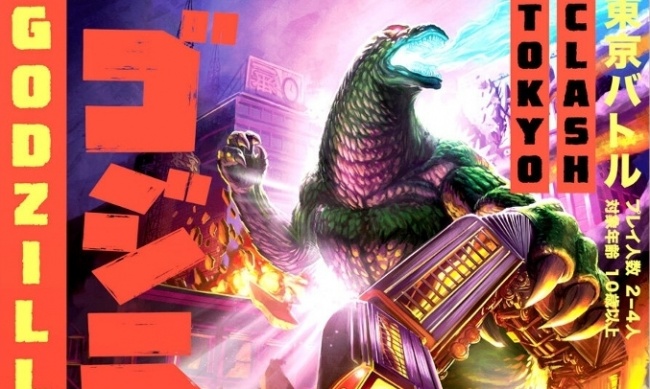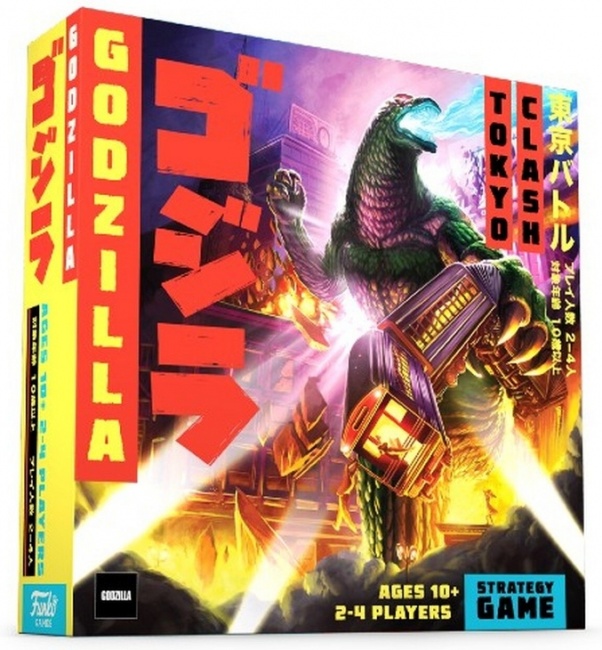Godzilla: Tokyo Clash
Publisher: Funko Games
Release Date: June 2020 (Target Exclusive)/October 2020 (Other Trade)
MSRP: $34.99
Designers: Prospero Hall
Number of Players: 2 – 4
Playing Time: 45 minutes
Product #: 88969848713 (UPC)
Age Rating: 10 and up
ICv2 Rating: 4 Stars out of 5
Kaiju, the "giant monsters" of cinematic glory, continue to be popular in many entertainment genres. I suspect it is the visceral joy of crushing buildings, tossing tanks around like baseballs, and generally releasing a cataclysmic smackdown on everything that irritates you. Funko Games jumps into the fray with the granddaddy of kaiju, Godzilla himself, in this quick little king-of-the-hill style game.
Summary: As one of four different movie monsters, Godzilla, of course, King Ghidorah, Mothra, or Megalon, your task is to prove to the other monsters that you alone deserve the title "King of the Monsters," primarily by beating the stuffing out of all the other monsters. This battle royale is set in a 1960s-aesthetic Tokyo, which the monsters gleefully destroy in order to acquire the "energy" they need to power their attacks.
The action is controlled by cards. Each monster has their own unique deck which represents their strengths and weaknesses. Godzilla, for example, has powerful defenses and devastating Mega Heat Ray attacks that he must spend time powering up for maximum effect. Mothra, on the other hand, enjoys tremendous mobility and a friendly relationship with the humans. Players spend the energy they acquired from smashing buildings to play their cards, allowing their monster to move, attack, and defend, or take a variety of other actions based on their monster’s personality. Cards also serve as the scoring mechanic: If you can strike an opponent hard enough to penetrate their defenses, you get to take cards out of their deck as trophies. They lose access to those cards, while you get to score points. In the end, victory goes to the monster with the most trophies.
The game board is composed of tiles that create a random cityscape for the monsters to rampage around, allowing for more variability of game play. Non-player defenders, such as tanks or fighter jets, will try vainly to protect the city, and these also add variation to the gameplay as only two of the eight are used in each game.
Originality: Godzilla: Tokyo Clash combines a number of proven game mechanics along with some pretty clever ideas. For example, even the most powerful attacks usually only award one trophy card, preventing a lucky player or early leader from running away with the game. Meanwhile, losing trophy cards generally makes a monster’s deck leaner, helping them draw cards needed for combos. The end result is a game that (in my experience at least) is always competitive to the end.
Presentation: The box is fantastic. It looks like somebody zapped a Toho movie poster with a Xilien ray gun and converted it into a game box. The color palette is a little narrow, I think, but the artwork is dramatic and exciting and captures the gleeful destruction that lurks inside. The game description is minimal, but communicates the idea nicely and saves box space for a component shot and images of the monsters. And the monsters are the coolest thing in the box, as one would expect: The four monster minis, each about 2.5 inches tall, are some of the nicest game components I’ve seen in a while, and the three-dimensional buildings make a visually appealing battleground to wrestle over.
Quality: I wish that Funko had given as much love to the other components. Only about a third of the buildings are three-dimensional. The other buildings and all the city defenders are flat tokens. The building tokens are very small, while the defenders are sometimes large enough to cause crowding in spaces. Most inexplicably, the game comes with only 32 building tokens, but the full-scale four-player battleground calls for 33—a strange oversight considering the care taken with so many other elements of the game. The board tiles are very serviceable, but I would have liked them to be a little bit thicker, and the playing cards are quite good. The rulebook is attractive and marvelously illustrated, but I would prefer simpler language and more explanation to make it easier for players with little game experience to learn.
Marketability: Godzilla continues to fascinate fans even decades after first stomping onto the silver screen, and fast-playing king-of-the-hill games have always been popular. The variable game board, random city defenders, and very different playing styles for each monster promises a good level of replayability. And the monsters are just cool to look at. The price point is, I think, a touch high for what’s in the box; if the smaller buildings and the city defenders were 3D instead of tokens, it would have been twice as awesome.
Overall: Godzilla: Tokyo Clash is, ultimately, fun. It’s fun pretending to be a giant monster, smashing buildings and hurling tanks at other giant monsters. It’s fun to explore the abilities of each monster and find strategies to take advantage of them (I’m team Mothra all the way!). And it’s fun to give another monster a good whomping! There are sophisticated kaiju games out there with deeper strategic play and lighter ones with silly, mindless fun, but for me, this settles into that in-between place that offers a good balance of strategy and luck, and rewards thoughtful play without getting bogged down.
On the other hand, some of the components are disappointing. Crushing 3D buildings is so much fun that plucking flat tokens off the board just feels unrewarding. And, I wish that the rulebook was more accessible, because this would be a good gateway-level strategy game for fans of the genre. But, I enjoy the game enough to overlook its flaws. And that’s why I’m giving this game 4 out of 5.
-Will Niebling

ICv2 Stars: 4 (out of 5)
Posted by William Niebling on August 31, 2020 @ 2:51 am CT



